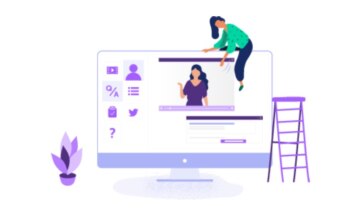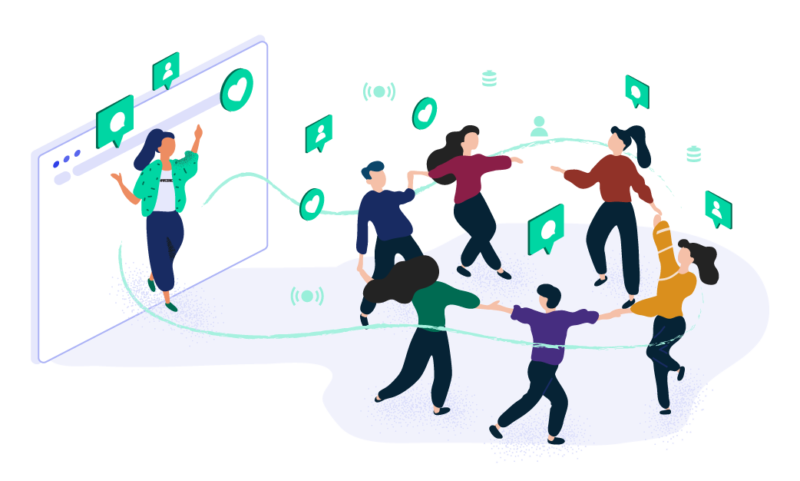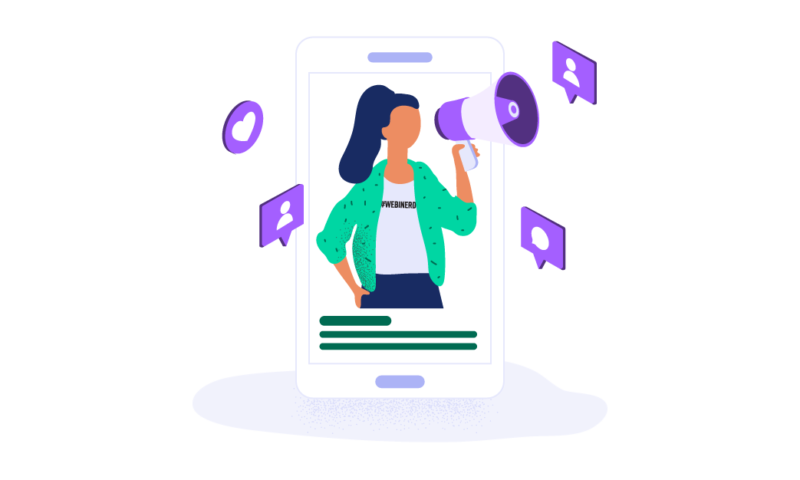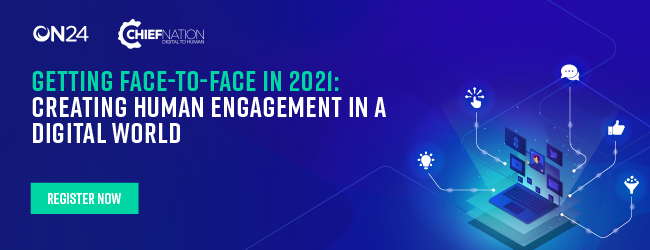To Influence Today’s Digital Buyer, Build Digital Experiences

2020 has seen an unexpected shift in the way marketers are interacting with their clients and customers. Virtual engagement is now a necessity rather than a nice-to-have.
But as organisations around the world continue to move their physical events into the digital world, marketers need innovative solutions to create personalised virtual experiences that boost engagement and drive revenue.
Speaking at an exclusive Chief Wine Officer virtual event in November, Mark Bornstein, Vice President of Marketing for webinar providers ON24 provided some fascinating insight into the future of digital marketing for 2021 and beyond. Here’s what we learned.
This post originally appeared on CEO.Digital.com. Shared with permission.
How Do We Connect in a Virtual World?

In March 2020, when businesses were forced to shut their doors and embark on an unspecified period of remote working, marketing leaders were under pressure to adapt their marketing strategies and incorporate virtual alternatives to face-to-face engagement.
Pre-set timelines for digital transformation were rapidly accelerated. For many, it was a period of trial and error but now, almost ten months on, virtual events and digital engagement are the new norm.
The Age of the Digital Buyer

Despite the speed of technological change triggered by the onset of the global pandemic, this period of digital transformation has been on the horizon for some time.
This is the Age of the Digital Buyer, where the Digital Buyer is the most prominent threat — and opportunity — to the high-tech industry.
They’re more empowered
More than ever before, digital age B2B buyers want to control their own journey. They take in content on their terms, gathering information and waiting until much later in the sales process to interact with a company representative.
They’re more social
While B2B buying decisions are undoubtedly based on data-driven analysis and calculated reasoning, the Digital Buyer is influenced by emotional factors, too.
With the proliferation of mobile and social platforms, these buyers now expect digital experiences that are convenient, compelling and personalised.
The idea that marketers can control a buyer’s journey is complex. As a relatively new breed, marketers must adapt their approach to the Digital Buyer in order to remain relevant.
Engagement through Experience

The B2B Digital Buyer wants connection and authenticity.
In order to keep up with evolving consumer demands and expectations, digital marketing needs to adapt. It’s here that marketers have an opportunity – the opportunity to rethink marketing in a digital world. And it starts with engagement, specifically through demand generation marketing efforts that prioritize audience connection.
This could mean reconsidering the technologies we’re already currently using – why not do it differently?
In an era of virtual engagement, and in order to stand out from the crowd, marketers must consider building channels of experience. Ask yourself: How can I replace this static piece of content with something experiential?
Growing numbers of marketers are allocating more budget to experiential marketing, even over advertising. It’s expected that in 2021, more than half of CMOs will spend at least a fifth of their budget on experiential marketing.
Of course, the current halt to face-to-face engagement limits the extent of immersive marketing efforts. However as Mark Bornstein, VP of Marketing at ON24, passionately affirms, digital events and online content can be just as experiential in style and form as physical experiences.
DIGITAL EVENTS
Interview style shows, digital breakfast discussions, and talk show format webinars are just some of the more interactive alternatives to traditional virtual engagement.
Take inspiration from popular chat shows and consider the setting of your most fruitful, exploratory conversations (likely over a mug of something hot and a few biscuits).
Having a skilled, engaging and knowledgeable keynote speaker is one of the key ingredients to any event – be it live or virtual.
PowerPoints with static images and reams of text are not engaging, especially over a digital platform. Serial programming experiences are what audiences are subscribing to, so give them what they want.
Curating Inbound Content Experiences

Historically, websites have been static. But through the advancement of technology, we now have the ability to make them dynamic and experiential.
Let’s consider Netflix. As of November 2020, almost 200 million people globally had an account, and yet every single one of those home screens is guaranteed to look different.
Netflix has been curated with the Digital Buyer firmly in mind. Through integrated CTAs, film suggestions based on previous viewings, and targeted previews, users aren’t even required to hit the ‘Play’ button anymore; hover over a film and it plays for you.
Netflix is successful because it’s personalised – it knows what we like.
In the same vein, marketers can use their company website to personalise experiences for key audiences.
Curating Outbound Content Experiences

First thing’s first: stop with the digital spam. Sending unsolicited messages to large numbers of recipients is, simply put, lazy marketing.
The fact that the percentage of global spam fell from 94% in 2007 to 28% in 2020 reinforces this. In the Age of the Digital buyer, deliberate and meaningful engagement is key.
Building on from an already-popular marketing trend, 2021 will see a trend towards more focused Account-Based Marketing (ABM).
ABM strategies that incorporate Netflix-style targeted landing pages will be a popular tactic among marketers. These landing pages can be segmented by audience to make them hyper-personal and further encourage engagement with a product or service.
Content Is King

Content marketing is three times more efficient in terms of leads than outbound marketing and is still very much at the heart of digital marketing. Producing engaging and relevant content continues to be a vital tactic for bringing in traffic and encouraging conversions.
With the content industry more competitive than ever, marketers must consider more technical aspects – such as Personalisation – and ensure that they’re effectively battling for consumers’ attention. It’s this battle that’s led content to change at a rapid pace, with competition leading to increased levels of innovation.
In order to stay competitive in today’s digital landscape, marketers must enable their audience to self-select. That means the content on your website and social platforms must be varied.
There’s no ‘one size fits all’ when it comes to human beings, and so your content should reflect a diverse and multifaceted audience.
Produce different types of content that can be experienced in a variety of ways. Some people prefer watching videos while others would rather be scanning an infographic or reading a blog post.
By offering a range of content, marketers can ensure that they’re cultivating experiences for everyone, and increasing their chances of progressing leads along the funnel.
Digital Engagement Matters

A marketer’s job is to turn people from leads into revenue. That’s why all marketing should be an engaging digital experience.
Digital engagement is how we get real, valuable data. In other words, it’s how marketers come to understand the people they are selling to.
The advancement of technology has made it possible to capture vital information on how people are interacting with your website. This includes time spent on a page/video, what’s being watched, and what CTAs are being clicked on.
Now that everything is digital, marketers can capture all they need to get actionable insights and data about the types of people they’re attracting to their website, social platforms and events. By understanding a prospects’ digital body language, marketers can spark conversations – and generate pipeline.
Engagement + Content + Data = Conversations

According to Forbes, people retain 95% of a message when they watch a video in comparison to 10% when they read text. Plus, video is shared 1,200% more than both links and text combined.
Digital marketing has evolved with the speed of technology over the last decade. Changes in how and where we consume content is urging brands to be more personal, and to focus on the digital marketing ‘experience’.
The Digital Buyer wants digital experiences they can connect to on an emotional level. Growth in the new relationship economy will favor brands that leverage Emotional Intelligence (EQ) to personalise, engage, and connect with customers immediately and transparently.
By offering a diverse range of dynamic content and leveraging the power of data, marketers can gain a deeper understanding of their customers and prospects, enabling them to spark those all-important conversations that turn leads into revenue.
